Yi-Chen Li
Multi-agent In-context Coordination via Decentralized Memory Retrieval
Nov 13, 2025



Abstract:Large transformer models, trained on diverse datasets, have demonstrated impressive few-shot performance on previously unseen tasks without requiring parameter updates. This capability has also been explored in Reinforcement Learning (RL), where agents interact with the environment to retrieve context and maximize cumulative rewards, showcasing strong adaptability in complex settings. However, in cooperative Multi-Agent Reinforcement Learning (MARL), where agents must coordinate toward a shared goal, decentralized policy deployment can lead to mismatches in task alignment and reward assignment, limiting the efficiency of policy adaptation. To address this challenge, we introduce Multi-agent In-context Coordination via Decentralized Memory Retrieval (MAICC), a novel approach designed to enhance coordination by fast adaptation. Our method involves training a centralized embedding model to capture fine-grained trajectory representations, followed by decentralized models that approximate the centralized one to obtain team-level task information. Based on the learned embeddings, relevant trajectories are retrieved as context, which, combined with the agents' current sub-trajectories, inform decision-making. During decentralized execution, we introduce a novel memory mechanism that effectively balances test-time online data with offline memory. Based on the constructed memory, we propose a hybrid utility score that incorporates both individual- and team-level returns, ensuring credit assignment across agents. Extensive experiments on cooperative MARL benchmarks, including Level-Based Foraging (LBF) and SMAC (v1/v2), show that MAICC enables faster adaptation to unseen tasks compared to existing methods. Code is available at https://github.com/LAMDA-RL/MAICC.
Controlling Large Language Model with Latent Actions
Mar 27, 2025Abstract:Adapting Large Language Models (LLMs) to downstream tasks using Reinforcement Learning (RL) has proven to be an effective approach. However, LLMs do not inherently define the structure of an agent for RL training, particularly in terms of defining the action space. This paper studies learning a compact latent action space to enhance the controllability and exploration of RL for LLMs. We propose Controlling Large Language Models with Latent Actions (CoLA), a framework that integrates a latent action space into pre-trained LLMs. We apply CoLA to the Llama-3.1-8B model. Our experiments demonstrate that, compared to RL with token-level actions, CoLA's latent action enables greater semantic diversity in text generation. For enhancing downstream tasks, we show that CoLA with RL achieves a score of 42.4 on the math500 benchmark, surpassing the baseline score of 38.2, and reaches 68.2 when augmented with a Monte Carlo Tree Search variant. Furthermore, CoLA with RL consistently improves performance on agent-based tasks without degrading the pre-trained LLM's capabilities, unlike the baseline. Finally, CoLA reduces computation time by half in tasks involving enhanced thinking prompts for LLMs by RL. These results highlight CoLA's potential to advance RL-based adaptation of LLMs for downstream applications.
Q-Adapter: Training Your LLM Adapter as a Residual Q-Function
Jul 04, 2024Abstract:We consider the problem of adapting Large Language Models (LLMs) pre-trained with Reinforcement Learning from Human Feedback (RLHF) to downstream preference data. Naive approaches to achieve this could be supervised fine-tuning on preferred responses or reinforcement learning with a learned reward model. However, the LLM runs the risk of forgetting its initial knowledge as the fine-tuning progresses. To customize the LLM while preserving its existing capabilities, this paper proposes a novel method, named as Q-Adapter. We start by formalizing LLM adaptation as a problem of maximizing the linear combination of two rewards, one of which corresponds to the reward optimized by the pre-trained LLM and the other to the downstream preference data. Although both rewards are unknown, we show that this can be solved by directly learning a new module from the preference data that approximates the \emph{residual Q-function}. We consider this module to be an adapter because the original pre-trained LLM, together with it, can form the optimal customised LLM. Empirically, experiments on a range of domain-specific tasks and safety alignment tasks illustrate the superiority of Q-Adapter in both anti-forgetting and learning from new preferences.
Improving Sample Efficiency of Reinforcement Learning with Background Knowledge from Large Language Models
Jul 04, 2024



Abstract:Low sample efficiency is an enduring challenge of reinforcement learning (RL). With the advent of versatile large language models (LLMs), recent works impart common-sense knowledge to accelerate policy learning for RL processes. However, we note that such guidance is often tailored for one specific task but loses generalizability. In this paper, we introduce a framework that harnesses LLMs to extract background knowledge of an environment, which contains general understandings of the entire environment, making various downstream RL tasks benefit from one-time knowledge representation. We ground LLMs by feeding a few pre-collected experiences and requesting them to delineate background knowledge of the environment. Afterward, we represent the output knowledge as potential functions for potential-based reward shaping, which has a good property for maintaining policy optimality from task rewards. We instantiate three variants to prompt LLMs for background knowledge, including writing code, annotating preferences, and assigning goals. Our experiments show that these methods achieve significant sample efficiency improvements in a spectrum of downstream tasks from Minigrid and Crafter domains.
BWArea Model: Learning World Model, Inverse Dynamics, and Policy for Controllable Language Generation
May 27, 2024



Abstract:Large language models (LLMs) have catalyzed a paradigm shift in natural language processing, yet their limited controllability poses a significant challenge for downstream applications. We aim to address this by drawing inspiration from the neural mechanisms of the human brain, specifically Broca's and Wernicke's areas, which are crucial for language generation and comprehension, respectively. In particular, Broca's area receives cognitive decision signals from Wernicke's area, treating the language generation as an intricate decision-making process, which differs from the fully auto-regressive language generation of existing LLMs. In a similar vein, our proposed system, the BWArea model, conceptualizes language generation as a decision-making task. This model has three components: a language world model, an inverse dynamics model, and a cognitive policy. Like Wernicke's area, the inverse dynamics model is designed to deduce the underlying cognitive intentions, or latent actions, behind each token. The BWArea model is amenable to both pre-training and fine-tuning like existing LLMs. With 30B clean pre-training tokens, we have trained a BWArea model, which achieves competitive performance with LLMs of equal size (1B parameters). Unlike fully auto-regressive LLMs, its pre-training performance does not degenerate if dirty data unintentionally appears. This shows the advantage of a decomposed structure of BWArea model in reducing efforts in laborious data selection and labeling. Finally, we reveal that the BWArea model offers enhanced controllability via fine-tuning the cognitive policy with downstream reward metrics, thereby facilitating alignment with greater simplicity. On 9 out of 10 tasks from two suites, TextWorld and BigBench Hard, our method shows superior performance to auto-regressive LLMs.
Any-step Dynamics Model Improves Future Predictions for Online and Offline Reinforcement Learning
May 27, 2024Abstract:Model-based methods in reinforcement learning offer a promising approach to enhance data efficiency by facilitating policy exploration within a dynamics model. However, accurately predicting sequential steps in the dynamics model remains a challenge due to the bootstrapping prediction, which attributes the next state to the prediction of the current state. This leads to accumulated errors during model roll-out. In this paper, we propose the Any-step Dynamics Model (ADM) to mitigate the compounding error by reducing bootstrapping prediction to direct prediction. ADM allows for the use of variable-length plans as inputs for predicting future states without frequent bootstrapping. We design two algorithms, ADMPO-ON and ADMPO-OFF, which apply ADM in online and offline model-based frameworks, respectively. In the online setting, ADMPO-ON demonstrates improved sample efficiency compared to previous state-of-the-art methods. In the offline setting, ADMPO-OFF not only demonstrates superior performance compared to recent state-of-the-art offline approaches but also offers better quantification of model uncertainty using only a single ADM.
Disentangling Policy from Offline Task Representation Learning via Adversarial Data Augmentation
Mar 12, 2024
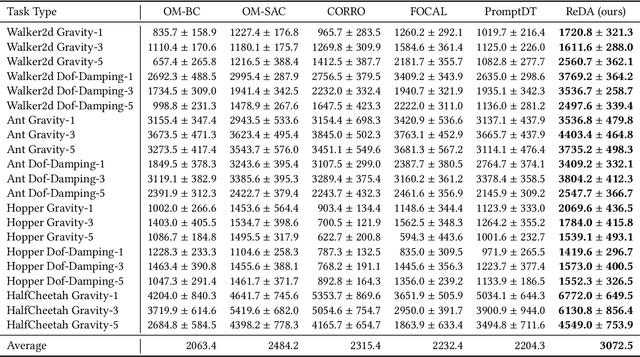
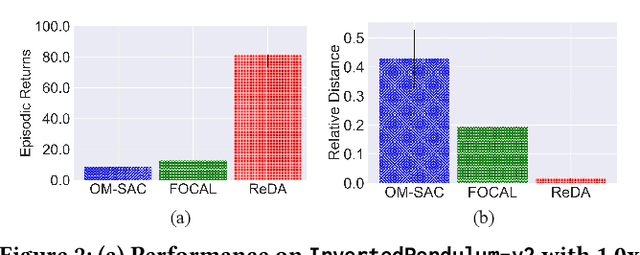
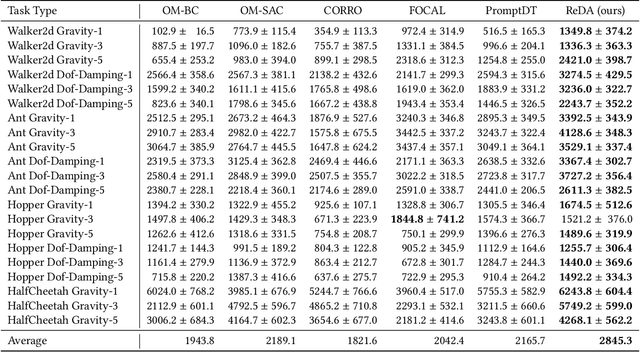
Abstract:Offline meta-reinforcement learning (OMRL) proficiently allows an agent to tackle novel tasks while solely relying on a static dataset. For precise and efficient task identification, existing OMRL research suggests learning separate task representations that be incorporated with policy input, thus forming a context-based meta-policy. A major approach to train task representations is to adopt contrastive learning using multi-task offline data. The dataset typically encompasses interactions from various policies (i.e., the behavior policies), thus providing a plethora of contextual information regarding different tasks. Nonetheless, amassing data from a substantial number of policies is not only impractical but also often unattainable in realistic settings. Instead, we resort to a more constrained yet practical scenario, where multi-task data collection occurs with a limited number of policies. We observed that learned task representations from previous OMRL methods tend to correlate spuriously with the behavior policy instead of reflecting the essential characteristics of the task, resulting in unfavorable out-of-distribution generalization. To alleviate this issue, we introduce a novel algorithm to disentangle the impact of behavior policy from task representation learning through a process called adversarial data augmentation. Specifically, the objective of adversarial data augmentation is not merely to generate data analogous to offline data distribution; instead, it aims to create adversarial examples designed to confound learned task representations and lead to incorrect task identification. Our experiments show that learning from such adversarial samples significantly enhances the robustness and effectiveness of the task identification process and realizes satisfactory out-of-distribution generalization.
Debiased Offline Representation Learning for Fast Online Adaptation in Non-stationary Dynamics
Feb 17, 2024



Abstract:Developing policies that can adjust to non-stationary environments is essential for real-world reinforcement learning applications. However, learning such adaptable policies in offline settings, with only a limited set of pre-collected trajectories, presents significant challenges. A key difficulty arises because the limited offline data makes it hard for the context encoder to differentiate between changes in the environment dynamics and shifts in the behavior policy, often leading to context misassociations. To address this issue, we introduce a novel approach called Debiased Offline Representation for fast online Adaptation (DORA). DORA incorporates an information bottleneck principle that maximizes mutual information between the dynamics encoding and the environmental data, while minimizing mutual information between the dynamics encoding and the actions of the behavior policy. We present a practical implementation of DORA, leveraging tractable bounds of the information bottleneck principle. Our experimental evaluation across six benchmark MuJoCo tasks with variable parameters demonstrates that DORA not only achieves a more precise dynamics encoding but also significantly outperforms existing baselines in terms of performance.
Imitator Learning: Achieve Out-of-the-Box Imitation Ability in Variable Environments
Oct 09, 2023Abstract:Imitation learning (IL) enables agents to mimic expert behaviors. Most previous IL techniques focus on precisely imitating one policy through mass demonstrations. However, in many applications, what humans require is the ability to perform various tasks directly through a few demonstrations of corresponding tasks, where the agent would meet many unexpected changes when deployed. In this scenario, the agent is expected to not only imitate the demonstration but also adapt to unforeseen environmental changes. This motivates us to propose a new topic called imitator learning (ItorL), which aims to derive an imitator module that can on-the-fly reconstruct the imitation policies based on very limited expert demonstrations for different unseen tasks, without any extra adjustment. In this work, we focus on imitator learning based on only one expert demonstration. To solve ItorL, we propose Demo-Attention Actor-Critic (DAAC), which integrates IL into a reinforcement-learning paradigm that can regularize policies' behaviors in unexpected situations. Besides, for autonomous imitation policy building, we design a demonstration-based attention architecture for imitator policy that can effectively output imitated actions by adaptively tracing the suitable states in demonstrations. We develop a new navigation benchmark and a robot environment for \topic~and show that DAAC~outperforms previous imitation methods \textit{with large margins} both on seen and unseen tasks.
Policy Regularization with Dataset Constraint for Offline Reinforcement Learning
Jun 11, 2023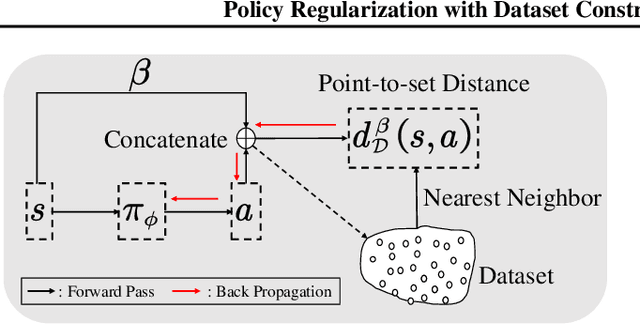
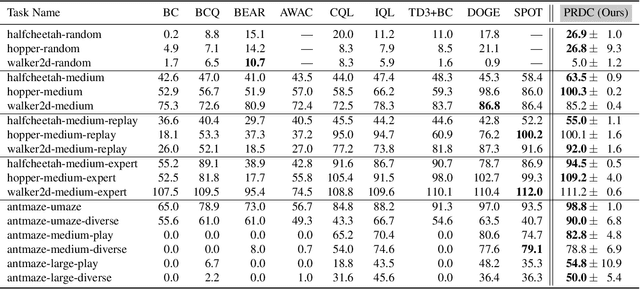
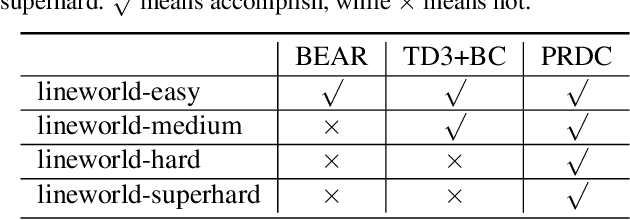
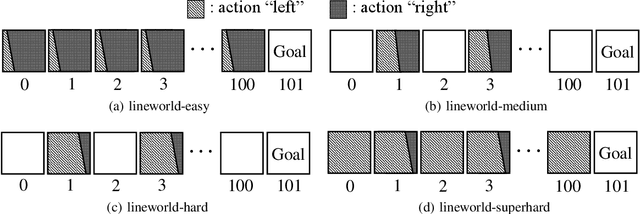
Abstract:We consider the problem of learning the best possible policy from a fixed dataset, known as offline Reinforcement Learning (RL). A common taxonomy of existing offline RL works is policy regularization, which typically constrains the learned policy by distribution or support of the behavior policy. However, distribution and support constraints are overly conservative since they both force the policy to choose similar actions as the behavior policy when considering particular states. It will limit the learned policy's performance, especially when the behavior policy is sub-optimal. In this paper, we find that regularizing the policy towards the nearest state-action pair can be more effective and thus propose Policy Regularization with Dataset Constraint (PRDC). When updating the policy in a given state, PRDC searches the entire dataset for the nearest state-action sample and then restricts the policy with the action of this sample. Unlike previous works, PRDC can guide the policy with proper behaviors from the dataset, allowing it to choose actions that do not appear in the dataset along with the given state. It is a softer constraint but still keeps enough conservatism from out-of-distribution actions. Empirical evidence and theoretical analysis show that PRDC can alleviate offline RL's fundamentally challenging value overestimation issue with a bounded performance gap. Moreover, on a set of locomotion and navigation tasks, PRDC achieves state-of-the-art performance compared with existing methods. Code is available at https://github.com/LAMDA-RL/PRDC
 Add to Chrome
Add to Chrome Add to Firefox
Add to Firefox Add to Edge
Add to Edge